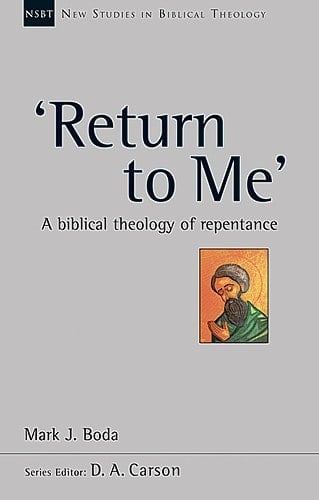⏱️ Estimated Reading Time: 5 min read
Repentance has to do with our relationship with God. That’s why Mark Boda has titled his book on the subject as Return to Me. Repentance isn’t just about a change of behavior though it involves that. Nor is it merely about a change in thinking, feeling, or desire, though it involves all of those things too. Repentance is about “a turn or return to faithful relationship with God from a former state of estrangement” (31). Boda makes a compelling case for this definition as he explores the theme across the canon of Scripture. But what claims to be a Biblical Theology of repentance often feels more like an Old Testament theology of repentance with a nod to the New Testament.
Boda is a respected Old Testament scholar, and so one can appreciate his emphasis on and bent towards the Old Testament in his treatment of this theme. He takes the time to look at all the major divisions of the Old Testament individually. His introduction sets the stage for his focus by considering the nature of Biblical theology, defining his terms, and outlining his approach. Chapters 2-10 focus directly on the development of the theme across the OT. He explores “Repentance in the Torah,” the former prophets, the later prophets, Isaiah get its own treatment, Jeremiah and Ezekiel, and the Twelve. Three chapters focus on “the Writings,” and then he concludes this OT discussion by considering a whole OT theology of repentance.
The New Testament doesn’t get nearly as thorough a treatment. In one chapter he reviews the contributions of the New Testament to the development of this theme, examining the Synoptic Gospels and Acts, John, the Epistles as a whole, and finally Revelation. His lack of in-depth analysis of the epistles is particularly surprising, given that they are the largest body of writing in the New Testament. He repeats his previous pattern by giving us a discussion of repentance within New Testament theology in chapter thirteen, but this treatment is nowhere close to the depth that the Old Testament received.
Chapter fourteen concludes the book with a discussion of theological implications. Though brief, this chapter is excellent as it seeks to apply the biblical-theological discoveries to our lives. Boda does not merely give information but serves us pastorally in this chapter.
One can appreciate the author’s emphasis on the Old Testament. Not only is the larger of the two canons, and not only does it set foundations for the theme’s development in the NT, but it is also the portion of Scripture which most clearly falls under Boda’s expertise. One cannot rightly claim a Biblical Theology if the focus is almost exclusively on the former covenant. This criticism standing, there is still lots of value to be seen in this tremendous volume from IVP’s New Studies in Biblical Theology.
Boda’s emphasis on relationship and his use of Scripture to support this definition are a welcome addition to the discussion on the subject. As the issue of repentance has been a significant theological talking point in the last several decades, it’s important to establish Biblical definitions. A relational definition can more adequately address the dangers of both legalism and license. The author also helps us to see the various elements of repentance and how they relate to one another. He avoids getting bogged down in word studies, which do not give the full picture. He writes:
Of course, sensitivity to the original language and its distinct vocabulary is relevant to expressing the message of the Bible in its own idiom, but research on vocabulary is only part of the task of biblical theology. The focus needs to be on themes that dominate the literature of the Old Testament and are expressed through a variety of linguistic means, including words, collocations, images, forms and related concepts. (25)
So while he spends some number of pages in the introduction discussing keywords in the lexical range, this is the only time he does such an exercise in the book. He focuses, instead, on a broader more useful understanding of the theme. This includes three major elements: “behavioral, affective, and verbal/ritual” (31).
Finally, the author’s examination of the relationship between human repentance and God’s enabling repentance is very welcomed. Much of the literature on repentance can tend to focus on our own responses, and there’s plenty of that in this volume. Boda also points to places across the canon where repentance is said to be either enabled or disenabled by God. God may grant repentance, through a changed heart, or He may not allow repentance, either through hardening a heart (as in Pharaoh) or through refusing to allow the prophets to preach repentance. God may also turn His ears away from repentance that has delayed too long in coming – we see this particularly in the prophets.
All of these various details make Return to Me, an excellent contribution to the literature on repentance and the theological discussions about it. Its weakness in thorough treatment of the New Testament development of the theme can be understood, and does not detract from the other value of the book. More work will need to be done, however, on the development of this important new covenant theme.



